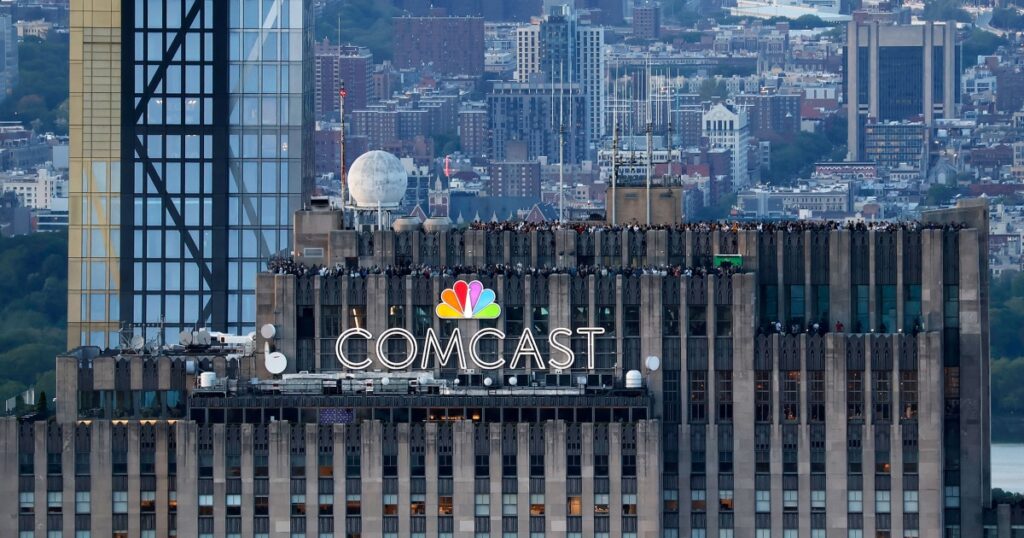Comcast announced Wednesday that it plans to spin off most of its cable television networks into separate publicly traded companies.
The new company will include USA Network, CNBC, MSNBC, Oxygen, E!, SYFY and Golf Channel. Comcast will retain key NBCUniversal assets, including the NBC broadcast network, NBC News, NBC Sports, streaming service Peacock, and cable channel Bravo.
“This transaction is structured as a tax-free spin to existing shareholders,” Comcast President Mike Kavanaugh said in an internal memo. “We do not have an exact timeline for completing the transition, but we estimate it will take approximately one year.”
Comcast owns NBCUniversal, the parent company of NBC News.
The move comes as traditional cable TV bundles face severe economic headwinds, particularly the rise of cord-cutting and the shift to streaming alternatives. Comcast’s cable portfolio continues to contribute to its financial bottom line and also contributes to its growing cultural footprint.
“A well-capitalized independent company will be well-positioned to lead in the changing landscape of cable networks, given the strength of its portfolio and the quality and focus of its management team,” Kavanaugh said.
The new company, known for now as SpinCo, will have “significant cash flow, a strong balance sheet, and the financial flexibility to pursue potential growth opportunities both organically and through acquisitions.” Kavanagh added.
Cavanagh said the new company will be led by Mark Lazarus, chairman of NBCUniversal’s media group. Anand Kini, NBCUniversal’s chief financial officer, will serve as CFO and chief operating officer.
The plan was first reported by the Wall Street Journal and later confirmed to NBC News on Tuesday by two people familiar with the matter.
The new business structure is also notable in that it separates MSNBC and CNBC from NBC News’ core reporting operations. It was not immediately clear whether the cable news channel and the network’s core news division would continue to share editorial resources.
Dan Ives, managing director and senior equity research analyst covering technology at Wedbush Securities, said in an email that the spinoff move is appealing to investors. Comcast stock rose about 0.5% in premarket trading Wednesday.
“The Street wanted this move, and we believe it would be a smart strategic move for both Comcast and a new spinoff with golden gem cable assets like CNBC and MSNBC,” he said. “While the cord-cutting movement is a headwind, we see brighter days ahead as cable defines new monetization and streaming avenues through subscription and content to build a strong advertising base for the future. .”
Rich Greenfield, a media technology analyst who often criticizes media companies for what he sees as a belated response to cord-cutting, put the move in blunt terms in an appearance on CNBC. Comcast. ”
“They’re getting out of the cable network business,” said Greenfield, co-founder of research firm LightShed Partners. “This is them saying we don’t want to be in this business. This is no longer a growth business. It will be for a long time, but it’s no longer a growth business.”
Kavanaugh also announced a reorganization of NBCUniversal’s leadership team on Wednesday.
Cesar Conde will continue to lead NBCUniversal News Group as chairman. The division includes NBC News, the NBC News Now streaming product, Telemundo, and local stations owned and operated by the company. Kavanaugh added that Conde “will work closely with me on other growth opportunities for NBCUniversal.”
Donna Langley will become chairman of NBCUniversal Entertainment & Studios, with broad oversight of all entertainment programming and marketing across NBC, Peacock, Bravo and the company’s film and television studios.
Matt Strauss will become chairman of NBCUniversal Media Group. Mark Woodbury will continue in his role as chairman and chief executive officer of Universal Destinations & Experiences, which operates theme parks and global consumer products businesses.
Comcast agreed to buy a majority stake in NBCUniversal from General Electric in 2009, combining one of the nation’s largest cable television operators with a large NBC media and entertainment business. Cable channels were seen as particularly lucrative acquisitions.
Since then, the rise of streaming entertainment has eroded the cable TV business, prompting waves of consumers to cancel their cable contracts in favor of platforms like Netflix and Amazon Prime Video.
Even in this environment, many cable channels remain profitable businesses, and some continue to generate strong cash flows for their corporate owners. However, the media industry as a whole believes that the cable market is in decline.
Comcast, like other major media conglomerates, has invested heavily in streaming. Peacock, which has a large library of NBCUniversal content and licensed programming from other studios, added 3 million subscribers during the third fiscal quarter, according to the company’s latest earnings report. I did. Comcast lost 365,000 cable TV customers during that period.



